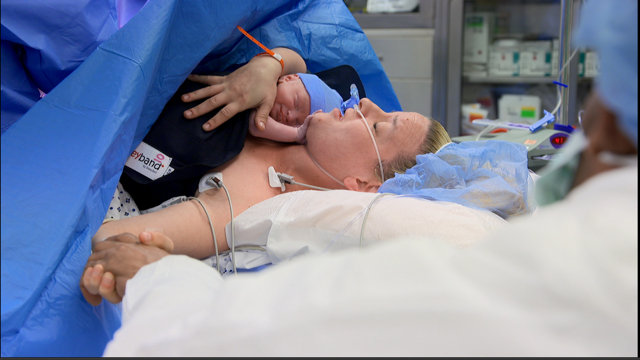In response to overwhelming clinical evidence about the importance of skin-to-skin contact between baby and mother immediately following birth, St. Paul’s Hospital is the first hospital in Canada to trial in its OR a new positioning band, the Joeyband, which facilitates skin to skin – especially in mothers who have C-sections.
Skin-to-skin contact normally involves a naked infant lying prone on a mother’s bare chest, with the infant’s back covered by a blanket. However, mothers who deliver by C-section face challenges with this. Due to the spinal epidural, severe fatigue, and/or shaking and heaviness in her arms, her ability to hold her baby is compromised. Her supine position, along with the surgical drape can also make it awkward to support the baby. Partners and spouses are often preoccupied with taking photos and are not able to assist with holding the baby.
“Many women who undergo C-sections opt not to hold their babies for fear the baby will fall,” said Scott Harrison, St. Paul’s director of maternity and NICU. “If a mother does attempt it, there is a tendency for the baby to slide towards her neck, making it difficult for her to see her newborn. The Joeyband is a solution that is long overdue and St. Paul’s Hospital is pleased to be the first in Canada to trial it in its OR. We are already seeing successful outcomes from it,” he said.
Joeyband a safe way to hold infants after C-sections
The Joeyband positioning band was specifically designed to provide early skin to skin in the OR by keeping the newborn in the correct position, preventing newborns’ falls and risk of suffocation. It increases maternal satisfaction with skin-to-skin experience during surgery by providing stability and ease for mothers in holding their babies.
A Canadian company, Mothers Choice Products, donated 10 Joeybands to St. Paul’s to be trialed on six patients. Made in Canada, the Joeyband enables early and continuous skin-to-skin contact in the OR, increasing the likelihood of exclusive breastfeeding at discharge. It doesn’t interfere with medical lines or equipment, and offers deep pressure touch to reassure the baby that she or he is safe. It also allows for quick access and removal in case of emergency, and minimizes a need for the nurse to hold the baby in skin-to-skin position.
Skin-to-skin contact key to exclusive breastfeeding success
Research has shown that one of the keys to successful breastfeeding is initiation of maternal/infant skin-to-skin contact within an hour after birth, and not interrupting that contact.
“It’s been a pleasure working together with St. Paul’s Hospital on their new initiative to introduce the JoeyBand by Sleepbelt into their maternity, NICU, and operating room environments,” said Veronica Wong, marketing manager, Mothers Choice Products. “We believe this to be a positive step in optimal maternal health care practices. In its effort to assist families with healthy and positive birthing experiences, (St. Paul’s) continues to be a leader in innovative health care Canada-wide.”
Breastfeeding rate typically lower among mothers who have C-sections
The World Health Organization (WHO) recommends that mothers worldwide exclusively breastfeed infants for the child’s first six months to achieve optimal growth, development and health. Exclusive breastfeeding is when the infant only receives breast milk without any additional food or drink, not even water.
The percentage of newborns receiving exclusive breast milk at St. Paul’s upon discharge is 55 per cent, the C-section rate is between 45 and 48 per cent. Studies show that the breastfeeding rate is lower among women who give birth by C-section compared to women who give birth vaginally.






This story brought a tear to my eye. Thank you for sharing